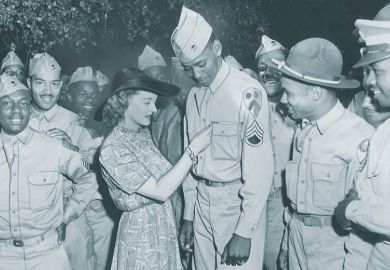T. S. Eliot wrote: "Human kind/ cannot bear very much reality'' - but give us an ersatz reality and we cannot get enough of it. It started innocently enough. In March 1895, the Lumiere brothers took a film shot - the first ever - of a group of workers leaving their factory in Lyon. The effects, though slow at first, gathered momentum exponentially, and have proved to be incalculable. In The Undeclared War, David Puttnam and Neil Watson focus on one particular ramification, Hollywood's affair with the rest of the world: that is, on power and money.
In the late 1970s Puttnam had a terrific pash for Hollywood and went out there to produce Foxes, directed by Adrian Lyne. He did not have a good time, the film flopped and he returned disillusioned. Success and Oscars for Chariots of Fire tempered his views somewhat. Then he was invited to lead Columbia, to be the first - and so far the only - Brit to run a Major. Within 18 months he was out. Since his return he has immersed himself in Euro film politics. His views have become less public; he is now more usually heard in European Union corridors of power. Over the years his public statements on Hollywood have been both admiring and critical and he has moved from one certainty to another without any intervening doubt. But show me a film-maker with a consistent view of Hollywood and I will show you either Michael Winner or a man who does not go to the movies.
Though the story of the early years is not unfamiliar, it is told here with passion, precision and wit. The scope and scale of research is truly impressive and there is a relish in the quick and vivid portrayals of the pioneers. Thomas Edison, for instance, who claimed the invention for himself, is, sadly, nothing like Spencer Tracey in the Hollywood biopic. In the movie he was a homespun genius committed to scientific and technological progress; he loved his workers and would have given them the shirt off his back. (Equally characteristically, in the British biopic, our man Friese-Green, or more precisely, Robert Donat, who until recently we thought was the Onlie Begetter, is portrayed as a loser. He died at a meeting pleading for unity in the British film industry.) Edison, nicknamed the Wizard, was certainly a prolific inventor but, first and foremost, he was in the business of acquiring patents. He is the role model for all those corporations intent on owning patents for all our genes. A capitalist entrepreneur living in the bastion of free enterprise, Edison was quick to cry "foul" when America was flooded with European films. He advocated tariffs and quotas but finally settled for a cartel. The call for tariffs and quotas would be heard over and again - but on the other side of the Atlantic.
The book rejoices in the ascendancy of Europe during the first decade. There was Charles Pathe, who developed the industrial structure of "vertical integration" - later refined to devastating effect by Hollywood - that is, development, production, distribution and exhibition under a single control. And there was Ole Olsen, who built the first proper film studio in Europe outside Copenhagen, and created Nordisk, then one of the most powerful film companies in the world.
Pathe and Olsen (and Melies and the Lumiere brothers) are described in fond but rational terms. When we get to the Hollywood moguls, black and white will not do; we switch into dazzling technicolour. Carl Laemmle, Adolph Zukor, the Warner Brothers, Louis B. Mayer, Sam Goldwyn and Irving Thalberg loom large. Apparently, Hollywood was created by Bonaparte, Alexander, the Borgias, Genghis Khan, the Marquis de Sade and Jane Austen.
The mogul epithet is apt, for the studio heads waged economic war. At first, power lay with those who owned and managed the invention, then it moved to the producers. During a shake-out, there was a kind of parity between the producers, the exhibitors and the go-betweens, the distributors. Then Pathe showed the logic of being all three. What is consistent throughout this period (and beyond) is the exercise of monopoly. At every stage, between and within groups, between and within nations, competition was fierce. The aim was always to obliterate the opposition. The authors say tartly: "Monopoly, it seemed, was a terrible thing - until you had one of your own.'' Two things emerge from the book: man is an economic animal and, in a capitalist society, competition inevitability leads to monopoly. Yet the name Marx is not mentioned anywhere in the book - and I do not mean Groucho.
The men who created Hollywood were immigrants. They came from the American poor and dispossessed. And it is urged here, and not for the last time, that they did not have to imagine what their audience wanted; they were at one with it in their desires, dreams, fantasies and ideals. They were joined at the hip. The result was a virtuous cultural, economic and political circle. Everybody, however poor, could go to the cinema; everybody, however uneducated and excluded from the culture of the elite, could understand moving pictures. Films made money, they spread culture and they were democratic. But business came first. Always.
Puttnam is in a curious position. In Britain we regard him as the most Hollywoodish of our producers; there they look on him as an English gentleman. Here we focus on his marketing skills, his ceaseless energy and the awareness, and use, of publicity; there they look at the films, which - apart from Midnight Express, written by Oliver Stone - are moral in a very British way. This ambiguity is not dispelled by the book. For instance, early on the authors introduce the seeds of the cultural argument. In 1907, Edmond Benoit-Levy, a French lawyer, theatre impresario and cinema exhibitor wrote: "What is a film? Is it a piece of ordinary merchandise that can be bought and used as one wishes? No I A film is a unique 'literary and artistic property'."
Puttnam does not avoid the question. On the contrary, he gives so many answers from so many different perspectives that I am at a loss as to where he stands. One thing, though, is absolutely clear: he hates the auteur theory, that is, the view that the director is the author of the film. His particular bete noire is Jean-Luc Godard, whom he dismisses as a "bourgeois revolutionary''. He tries to be charitable: "The auteur theory had begun as a polemical movement, based on a quintessentially romantic conception of the beleaguered artist, and it was designed in part to salvage the neglected reputations of certain Hollywood directors."
Puttnam misses the point. Audiences have, for a long time, without any promotion from the Nouvelle Vague, talked about a "John Ford'' film or a "Hitchcock" film, a "Renoir'' film or even a "Cecil B. DeMille'' film. They noticed that, despite changes of investor, producer, writer, story, crew, actors and genre, some films had a recognisable continuity of style and development. They felt they were being talked to by one person. They were in touch with one mind. It was down to the director: he was the author. The Nouvelle Vague extended this argument to all directors. This was clearly nonsense. In 99 per cent of films there is uncertainty of style. For one does not become the author of a film solely by being its director; authorship flows from vision. (Stanley Donen told me that, as a devotee of Hitchcock, he was once placed next to him at a dinner in Hollywood. When he asked the master about his next film, Hitchcock was very huffy. "You would not have asked Rembrandt what his next painting was going to be. It was going to be a Rembrandt. My next film will be a Hitchcock.") At the American Academy Awards, the producer collects the Best Picture Oscar (though Puttnam asked Hugh Hudson to join him on the platform, when he won it for Chariots). So, for Hollywood, the producer is the author: a view that is no more sustainable than the auteur theory. Puttnam himself confuses the issue. He writes about changes in Britain brought about by people from advertising: "As well as myself, this group included Alan Parker, Hugh Hudson, Adrian Lyne and Ridley Scott." These are all directors. Where are fellow producers like Alan Marshall? Or the writers and cinematographers?
As the mafiosi leader says in Robert Rossen and Abraham Polonsky's Body and Soul: "Everything's addition and subtraction. The rest is just conversation.'' In the United States, the law equates ownership with authorship. He who pays the piper owns the tune.
Puttnam blames the Nouvelle Vague and particularly Godard for many of Europe's ills. I tend to agree with him about Godard. Godard puts me in mind of a precocious child who wants to know how toys work - and leaves behind a trail of broken toys. He was more grammarian than artist and focused the attention of film-makers on the language of film. He was not interested in the audience. Almost single-handedly he paralysed film-making in Europe for a time. But that is not to do with the auteur theory. Throughout history, authors, whoever they are, have been known to be interested in the audience.
Puttnam respects the importance that Hollywood puts on marketing. The philosophy is simple: make it only if you can sell it. Selling means spending nearly as much on marketing as on production. They aim to win; we fear to lose. Distribution costs in the United Kingdom and Europe are an apology for distribution, a mere fraction of production costs. Puttnam says: "As a producer, I can make the most thrilling or challenging movie imaginable, with the best crew and the most talented cast, but unless I have a well-thought-out arrangement with an effective worldwide distribution resource ... I am, to a great extent, wasting my time.'' Aside from the fact that Puttnam seems to be "making" the film without a director, the argument is irrefutable. He does not, however, comment on Hollywood's ability to sell junk with as much commitment and skill as it gives to selling more nourishing stuff. The manipulation and cynicism is no less than Big Brother's in supplying pap to the proles.
The chapter on the intertwining of Hollywood and the US State Department should be required reading for the new prime minister. The US government has done, and will do, whatever it takes to ensure Hollywood's primacy. It is a matter of economy ("trade follows film"), of self-validation, of influence, of speaking to the world from a position of strength. Hollywood/the State Department talk about movies as a business but, like the first-generation moguls, they want the world.
Puttnam refers briefly to Goldcrest and his time at Columbia. He does not rewrite history but, as befits a film-maker, writes a new draft. I have no doubt there are more drafts to come. I do not recognise the Goldcrest that he describes: "one, relatively small independent production company". I seem to recall Goldcrest bestrode the world like a colossus. Or was that just Hollywood hype?
At one point he submitted a personal credo to Columbia's owners, Coke: "Movies ... can help to create a healthy, informed, concerned, and inquisitive society or, alternatively, a negative, apathetic, ignorant one ...There are two madnesses that film-makers must guard against. One is the belief that they can do everything, and the other is the belief that they can do nothing ...The former is arrogant ... the latter is irresponsible." I have to say that, in the battle to come, the call to guard against the extremes of manic depression is not a war cry that inspires this particular foot-soldier.
As one would expect from Puttnam, the book is beautifully produced and well illustrated. It touches on all the important issues. I do wish, though, that he had found more space to deal with the major artistic movements that changed film history. Even in what is an economic history of cinema, it is not enough, for example, to say only this about neorealism: "Although the Italian neorealist movement, led by directors like Roberto Rossellini, Vittorio de Sica and Luchino Visconti, achieved critical acclaim, for the most part their films flopped at the box office."
For the past 80 years, Hollywood has been on the attack; Europe has been on the defence. They have manipulated the marketplace; we have established quotas and charged levies. They have demanded free trade; we have emphasised culture. Their way leads to monopoly; our way seems to lead nowhere. Puttnam gives us ample warning about the battle to come - at the Gatt negotiations, in the cinemas, on television and in the new multimedia.
The new masters of Hollywood are, in some ways, more frightening than the old. When Barry Diller, former executive at ABC television and serving head of Paramount Pictures and 20th Century Fox, failed in his bid to own Paramount, he commented: "They won. We lost. Next."
The battle is not going to be easy.
Mamoun Hassan is head of editing, National Film and Television School. He was formerly head of the production board, British Film Institute, and managing director, National Film Finance Corporation.
The Undeclared War: The Struggle for Control of the World's Film Industry
Author - David Puttnam with Neil Watson
ISBN - 0 00 255675
Publisher - HarperCollins
Price - £18.00
Pages - 413
Register to continue
Why register?
- Registration is free and only takes a moment
- Once registered, you can read 3 articles a month
- Sign up for our newsletter
Subscribe
Or subscribe for unlimited access to:
- Unlimited access to news, views, insights & reviews
- Digital editions
- Digital access to THE’s university and college rankings analysis
Already registered or a current subscriber? Login



